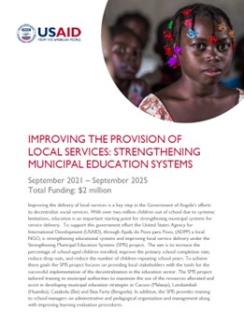September 2021 – September 2025
Total Funding: $2 million
OVERVIEW
Improving the delivery of local services is a key step in the Government of Angola’s efforts to decentralize social services. With over two million children out of school due to systemic limitations, education is an important starting point for strengthening municipal systems for service delivery. To support this government effort the United States Agency for International Development (USAID), through Ajuda do Povo para Povo, (ADPP) a local NGO, is strengthening educational systems and improving local service delivery under the Strengthening Municipal Education Systems (SMS) project. The aim is to increase the percentage of school-aged children enrolled, improve the primary school completion rate, reduce drop outs, and reduce the number of children repeating school years. To achieve these goals the SMS project focuses on providing local stakeholders with the tools for the successful implementation of the decentralization in the education sector.
The SMS project tailored training to municipal authorities to maximize the use of the resources allocated and assist in developing municipal education strategies in Cacuso (Malanje), Londuimbali (Huambo), Catabola (Bie) and Baia Farta (Benguela). In addition, the SMS provides training to school managers on administrative and pedagogical organization and management along with improving learning evaluation procedures.
ACTIVITIES
- Provide technical assistance in strategic planning in vector surveillance and control to Angola’s National Malaria Control Program
- Conduct a Municipal Education Mapping exercise to identify challenges and gaps and map available resources to address them
- Develop a Municipal Education Strategy based on the results of the mapping exercise
- Support Municipal administrations to use the Municipal Education Mapping to develop costed Municipal Education Strategies
- Develop COVID-19 mitigation plan to reduce the impact of discontinuance of classes
- Community awareness campaigns to advocate for massive school-aged children’s enrollments
- Work closely with Ministry of Justice at local level to ensure children have the necessary registration documents to start school
- Provide technical assistance to local education authorities and other local stakeholders including Parents Teachers Associations (PTAs)
- Facilitate communication between education authorities at the provincial and municipal levels
- Use existing ADPP’s resources at the selected municipalities through its Teachers Training Schools to enable SMS activity support locally
EXPECTED ACCOMPLISHMENTS
- 30,000 farmers, including 24,000 women, will benefit (directly or indirectly) from new, improved agricultural techniques, which will increase production
- Strengthened the capacity of municipal authorities to maximize use of existing resources
- 1,000 school’s directors and sub-directors’ complete professional development program
- 4,000 teachers have improved pedagogical skills and tools to monitor and evaluate the impact of their lessons
- 1,000 trainee teachers have improved pedagogical skills and tools to monitor and evaluate the impact of their lessons.
- 80 percent of schools have PTAs actively involved in Monitoring and Evaluation (M&E)
- 70 percent of schools carries our participatory M&E with the community
- 80 municipal education officials complete professional development program
- 4 municipalities have improved strategic plans for rural areas
- Increase over than 7 percent school enrollments, minimum 15 percent pupils completing primary education and reduce dropout rate by 55 percent

